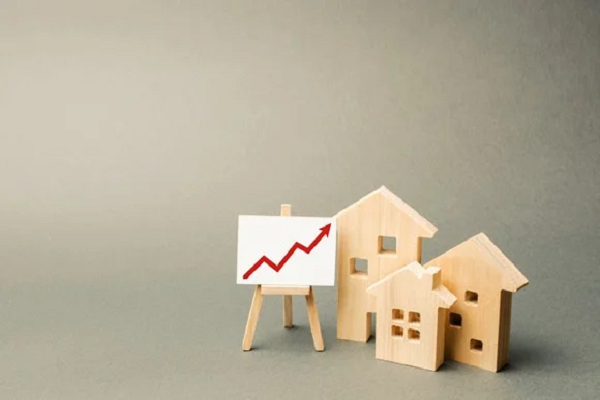House Price Hike of 5.5% Predicted Despite Spiralling Inflation Rate

With the continuing imbalance in demand and supply of homes available for sale, the competition among buyers to secure a property is pushing up average home prices across the UK.
According to the House Price Forecast February report, released by Really Moving, we can expect to see an increase of 5.5% in the price of the average home over the coming three months.
In numerical terms, this will push the average house price to a record-breaking £352,984, should the predictions prove to be accurate.
Although a fall of 0.9% has been recorded so far for March and a fall of 0.2% is expected in April, May is predicted to surge by 6.7%, thereby undoing the downturn in the previous months.
These figures represent an annual increase of 11.9% when compared with May 2021. Although it is worth taking into account that data from May 2021 showed a below-average price when compared with previous years,
Despite the cost of living rising exponentially, the price of the average property continues on an upward trajectory. This is chiefly due to the fact that the demand for homes is far greater than the available properties for sale.
Despite the price drops recorded for March and April, primarily due to the slowdown in sales at the beginning of this year, the appetite among buyers is showing no signs of abating, even with the impact of rising inflation on monthly bills.
The report captures the agreed purchase price for properties when a search is performed for conveyancing services, typically around twelve weeks before completion. This data enables Really moving to forecast property sales three months ahead of time.
A number of recent base rate rises by the Bank of England have had little effect on the housing market, despite the increased interest rates resulting in higher monthly mortgage payments for homeowners. The recent base rate hike, from 0.5% to 0.75% this month, means many buyers are keen to buy now in an attempt to secure a good mortgage deal before they are no longer available.
The Russian invasion of Ukraine, coupled with escalating energy prices and the rising CPI inflation rate, is having a detrimental impact on affordability for many UK citizens. Despite this, the growing lack of stock of housing is creating a strong selling environment with buyers in fierce competition to secure a property.
How will this effect first-time buyers?
Typically, first-time buyers are of the younger generation, who have been hit hard by the rising cost of living, fuel prices, and energy bills. Generally, the younger demographic has lower-paid employment and fewer savings than the older generation, making it particularly difficult to raise a sufficient deposit in order to qualify for a mortgage. With rental charges at an all-time high, many first-time buyers are finding it challenging to save and to get their foot on the property ladder. For those fortunate enough to have a deposit, it is becoming vital that they act now in an attempt to lock in a mortgage deal with a decent fixed interest rate before interest further escalates.
How will this effect movers?
People looking to move to a new property may find themselves in a better position than first-time buyers, provided that they have sufficient equity in their current property to cover any deposit needed. Obviously, the larger the equity, the better, in terms of accessing better deals with more competitive interest rates. Although we have yet to see a decline in home movers, with the uncertainty of the war in Ukraine and the spiralling cost of living, we can expect to see these figures significantly reduce in the near future.
CEO of Really moving, Rob Houghton, commented: “Last month we saw some early signs that the market may be beginning to slow, but the latest data shows prices rising sharply in May based on activity in February, suggesting that for now, the housing market will continue to defy expectations. We’re seeing a clash of post-pandemic-driven buyer demand and a cost-of-living crisis, which is only now really beginning to bite, yet it remains a seller’s market and the supply-demand imbalance is continuing to push up prices. It’s too early to assess the impact on consumer sentiment from the war in Ukraine, and if uncertainty grows and price rises become more painful, I expect we’ll see the tables begin to turn.”
“First Time Buyers are stuck between a rock and a hard place, watching prices go up along with mortgage rates while facing the challenge of trying to save while paying record-high rents—and a shortage of homes to buy. Many will be tempted to hold out for price falls, but our advice would always be to move when you have all your ducks in a row in terms of raising a deposit, securing a mortgage, and finding the right home to buy at a price you can afford. Buying with a long-term view—at least 3 to 5 years—will help you to ride out any short-term fluctuations, rather than trying to call the market.”




 0116 402 7982
0116 402 7982